.jpg.webp) Aerial view of the stadium in 2023 | |
| Location | 81 Central Avenue New Haven, Connecticut |
|---|---|
| Coordinates | 41°18′47″N 72°57′36″W / 41.313°N 72.960°W |
| Public transit | |
| Owner | Yale University |
| Operator | Yale University |
| Capacity | 61,446 (2006–present)
Former capacity: List
|
| Surface | Natural Grass (1914–2018) Field Turf (2019–present) |
| Construction | |
| Broke ground | August 1913 |
| Opened | November 21, 1914 110 years ago |
| Construction cost | US$750,000 ($21.9 million in 2022[1]) |
| Architect | Charles A. Ferry (Class of 1871) |
| Tenants | |
| Yale Bulldogs (NCAA) (1914–present) New York Giants (NFL) (1973–1974) Connecticut Bicentennials (NASL) (1976–1977) | |
| Website | |
| yalebulldogs.com/yale-bowl | |
Yale Bowl | |
  | |
| Coordinates | 41°18′47″N 72°57′38″W / 41.31306°N 72.96056°W |
| Built | 1914 |
| Architect | Charles A. Ferry; Sperry Engineering Co. |
| NRHP reference No. | 87000756 |
| Significant dates | |
| Added to NRHP | February 27, 1987 [2] |
| Designated NHL | February 27, 1987 [3] |
The Yale Bowl Stadium is a college football stadium in the northeast United States, located in New Haven, Connecticut, on the border of West Haven, about 1½ miles (2½ km) west of the main campus of Yale University. The home of the American football Yale Bulldogs team of the Ivy League, it opened in 1914 with 70,896 seats; renovations have reduced its current capacity to 61,446, still making it the second largest FCS stadium, behind Tennessee State's Nissan Stadium.
The Yale Bowl Stadium inspired the design and naming of the Rose Bowl, from which is derived the name of college football's post-season games (bowl games) and the NFL's Super Bowl.
In 1973 and 1974, the stadium hosted the New York Giants of the National Football League, as Yankee Stadium was renovated into a baseball-only venue and Giants Stadium was still in the planning and construction stages; the team was able to move to Shea Stadium in 1975.
History

Ground was broken on the stadium in August 1913. Fill excavated from the field area was used to build up a berm around the perimeter to create an elliptical bowl. The facade was designed to partially echo the campus's Neo-Gothic design, and, as with some central campus buildings, acid was applied to imitate the effects of aging.


It was the first bowl-shaped stadium in the country, and inspired the design of such stadiums as the Rose Bowl, the Los Angeles Memorial Coliseum, and Michigan Stadium. It was declared a National Historic Landmark in 1987 for its role in football history.[3][4]
The Yale Bowl's designer, Charles A. Ferry, for unknown reasons chose not to include locker rooms (or restrooms).[5] Players dress in the Smilow Field Center and walk 200 yards (185 m) to the field. When the NFL's Giants played at the stadium (1973, 1974), the pro players disliked the arrangement, but Yale players reportedly enjoy the walk. Fans cheer for the team as it marches to the stadium while the Yale Band plays, a tradition known as the "Bulldog Walk."[6]
The Bowl's first game, on November 21, 1914, drew more than 68,000 spectators,[7] who watched the Bulldogs lose 36–0 to rival Harvard.[5][8]
In 1958, a new scoreboard was installed; its distinctive clock was arranged vertically instead of horizontally.
During the 1970s, the Bowl hosted several concerts. In 1971, Yes performed on July 24 and the Grateful Dead on July 31, a recording of which was released as Road Trips Volume 1 Number 3. But neighborhood opposition to the concerts brought them to an end after a June 14, 1980, show featuring the Eagles, Heart, and The Little River Band. A picture from the show was published with the vinyl edition of the Eagles double live album, issued later that year, though no recordings from the event are included on the discs. A Paul McCartney concert was scheduled for June 1990, but cancelled amid neighbors' opposition; the show was moved to Chicago.
The stadium has hosted many soccer matches over the years; it served as home field for the Connecticut Bicentennials of the North American Soccer League during the 1976 and 1977 seasons. Yale Bowl was mulled as a possible playing site when the United States hosted the World Cup in 1994, but lost out to Foxboro Stadium in Massachusetts and Giants Stadium in New Jersey.[9]
In 1991, the Bowl's vicinity saw the addition of the Cullman-Heyman Tennis Center, home to the annual ATP/WTA event (the Pilot Pen tournament), across Yale Avenue from the stadium.
On October 5, 2001, the closing ceremony of the Yale Tercentennial was held at the Yale Bowl. Guests included Tom Wolfe '57, William F. Buckley '50, Sesame Street's Big Bird, Paul Simon '96 Hon, and Garry Trudeau '70.
By the 21st century, many of the outside retaining walls and portal entries were deteriorating. In the spring and summer of 2006, the bowl received a partial renovation, including a new scoreboard. The work was completed just in time for the first home game of the Yale football team's season on September 16.
The annual game between Yale and its rival Harvard, known locally as The Game, is held at the Yale Bowl every other year. In 2023, its attendance was over 51,000.[10]
Sports
Football
NFL
The New York Giants of the National Football League won just one of the dozen home games they played in New Haven in the 1973 and 1974 seasons. (With the exception of the games played with replacement teams during the 1987 NFL strike and the COVID-19-disrupted 2020 season, the attendance at the final game at the Yale Bowl is the smallest at a Giants' home game since 1955.) The team also played preseason games in the stadium, including the first ever game against its future rival and stadium share partner, the New York Jets, in 1969.[11]
| Date | Home | Opponent | Score | Attendance |
|---|---|---|---|---|
| October 7, 1973 | New York Giants | Green Bay Packers | 16–14 | 70,050 |
| October 14, 1973 | New York Giants | Washington Redskins | 21–3 | 70,168 |
| November 11, 1973 | New York Giants | Dallas Cowboys | 23–10 | 70,128 |
| November 18, 1973 | New York Giants | St. Louis Cardinals | 24–13 | 65,795 |
| December 16, 1973 | New York Giants | Minnesota Vikings | 31–7 | 70,041 |
| September 15, 1974 | New York Giants | Washington Redskins | 13–10 | 49,849 |
| September 22, 1974 | New York Giants | New England Patriots | 28–20 | 44,082 |
| October 6, 1974 | New York Giants | Atlanta Falcons | 14–7 | 42,379 |
| October 27, 1974 | New York Giants | Dallas Cowboys | 21–7 | 57,381 |
| November 10, 1974 | New York Giants | New York Jets | 26–20OT | 64,327 |
| November 24, 1974 | New York Giants | St. Louis Cardinals | 23–21 | 40,615 |
| December 8, 1974 | New York Giants | Philadelphia Eagles | 20–7 | 21,170 |
Soccer
International
| Date | Teams | Attendance |
|---|---|---|
| May 31, 1976 | Brazil | 36,096 |
| May 31, 1992 | Italy | 38,833 |
| June 6, 1993 | United States | 44,579 |
| May 28, 1994 | United States | 21,317 |
| June 10, 1994 | Italy | 23,547 |
NASL (1976-1977)
The Connecticut Bicentennials of the NASL played two seasons at the Yale Bowl, mostly in front of dismal crowds. Even their highest-ever home attendance, against the New York Cosmos in 1977, drew only 17,302 fans, leaving the stadium more than three-quarters empty. However, the Bi's could only draw a total of 57,438—less than the Bowl's capacity for a single game—in their other 21 home games combined, an average of only 2,735 per contest. After the 1977 season, the club relocated to become the Oakland Stompers.
| Date | Home | Opponent | Score | Attendance |
|---|---|---|---|---|
| June 2, 1976 | Connecticut Bicentennials | Rochester Lancers | 2 - 1 | 1,853 |
| June 12, 1976 | Connecticut Bicentennials | Miami Toros | 1-1 (S/O) | 3,105 |
| June 20, 1976 | Connecticut Bicentennials | Chicago Sting | 2-1 | 3,289 |
| June 24, 1976 | Connecticut Bicentennials | San Diego Jaws | 1-1 (S/O) | 1,642 |
| June 30, 1976 | Connecticut Bicentennials | San Antonio Thunder | 1-1 (S/O) | 1,426 |
| July 7, 1976 | Connecticut Bicentennials | Washington Diplomats | 2-1 (S/O) | 2,100 |
| July 24, 1976 | Connecticut Bicentennials | 4-4 (S/O) | 4,122 | |
| July 30, 1976 | Connecticut Bicentennials | Tampa Bay Rowdies | 0-7 | 3,800 |
| Aug. 14, 1976 | Connecticut Bicentennials | St. Louis Stars | 2-1 | 3,376 |
| May 8, 1977 | Connecticut Bicentennials | New York Cosmos | 2-3 | 17,302 |
| May 15, 1977 | Connecticut Bicentennials | Tampa Bay Rowdies | 1-4 | 1,520 |
| May 29, 1977 | Connecticut Bicentennials | San Jose Earthquakes | 3-2 | 2,257 |
| June 12, 1977 | Connecticut Bicentennials | Fort Lauderdale Strikers | 0-2 | 6,213 |
| June 15, 1977 | Connecticut Bicentennials | Team Hawaii | 1-2 | 1,295 |
| June 19, 1977 | Connecticut Bicentennials | St. Louis Stars | 0-3 | 1,222 |
| June 26, 1977 | Connecticut Bicentennials | Rochester Lancers | 2-1 | 2,832 |
| June 29, 1977 | Connecticut Bicentennials | Los Angeles Aztecs | 2-3 | 2,915 |
| July 13, 1977 | Connecticut Bicentennials | Las Vegas Quicksilvers | 4-3 | 3,472 |
| July 17, 1977 | Connecticut Bicentennials | 0-4 | 4,515 | |
| July 27, 1977 | Connecticut Bicentennials | Seattle Sounders | 1-4 | 2,169 |
| August 3, 1977 | Connecticut Bicentennials | Washington Diplomats | 4-1 | 1,100 |
| August 7, 1977 | Connecticut Bicentennials | Chicago Sting | 1-1 (S/O) | 3,215 |
Gallery
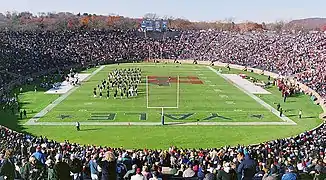 Yale v Harvard game, 2001
Yale v Harvard game, 2001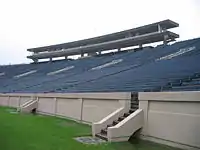 Grandstand, 2008
Grandstand, 2008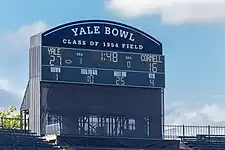 Yale Bowl scoreboard, behind north end zone, 2019
Yale Bowl scoreboard, behind north end zone, 2019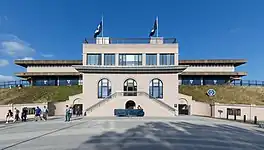 Main entrance, located on west side, 2019
Main entrance, located on west side, 2019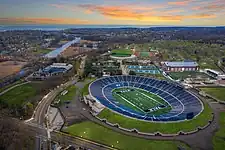 Aerial view, looking south towards Long Island Sound, 2021
Aerial view, looking south towards Long Island Sound, 2021
See also
References
- ↑ 1634–1699: McCusker, J. J. (1997). How Much Is That in Real Money? A Historical Price Index for Use as a Deflator of Money Values in the Economy of the United States: Addenda et Corrigenda (PDF). American Antiquarian Society. 1700–1799: McCusker, J. J. (1992). How Much Is That in Real Money? A Historical Price Index for Use as a Deflator of Money Values in the Economy of the United States (PDF). American Antiquarian Society. 1800–present: Federal Reserve Bank of Minneapolis. "Consumer Price Index (estimate) 1800–". Retrieved May 28, 2023.
- ↑ "National Register Information System". National Register of Historic Places. National Park Service. January 23, 2007.
- 1 2 "Yale Bowl". National Historic Landmark summary listing. National Park Service. Retrieved October 3, 2007.
- ↑ James H. Charleton (December 1985). "National Register of Historic Places Inventory-Nomination: Yale Bowl". National Park Service. and Accompanying aerial photo, from 1985
- 1 2 Amore, Dom (November 13, 2014). "Yale Bowl starts big, and 100 years later, it remains special". Hartford Courant. (Connecticut). Retrieved December 1, 2017.
- ↑ Schonbrun, Zach (November 2, 2014). "At Yale Bowl, 100 Years of Tradition, Pride and No Locker Rooms". The New York Times. Retrieved September 11, 2015.
- ↑ "Greatest football crowd ever, sees big match". The Day. (New London, Connecticut). November 21, 1914. p. 13.
- ↑ "Yale victim of bad breaks or score might have been closer". Spokesman-Review. (Spokane, Washington). November 22, 1914. p. 1, part 3.
- ↑ Hartford Courant: Yale Bowl Loses World Cup Bid
- ↑ https://www.facebook.com/yalealumnimagazine/posts/pfbid02JC1xswNjdUvccbhwArjLGRudKTRKXMLehE4PScLxXiW9xyP3oGV29Pa2d4zY63Fel
- ↑ Wallace, William M. (August 18, 1969). "Jets Beat Giants, 37–14; Namath Completes 14 of 16 Passes, 3 for Scores; BATTLE RETURNS PUNT FOR 86 YARDS 70,874 Fans See Jet Rookie Score in Yale Bowl – Mathis Tallies Two Touchdowns". The New York Times. Retrieved March 18, 2007.
